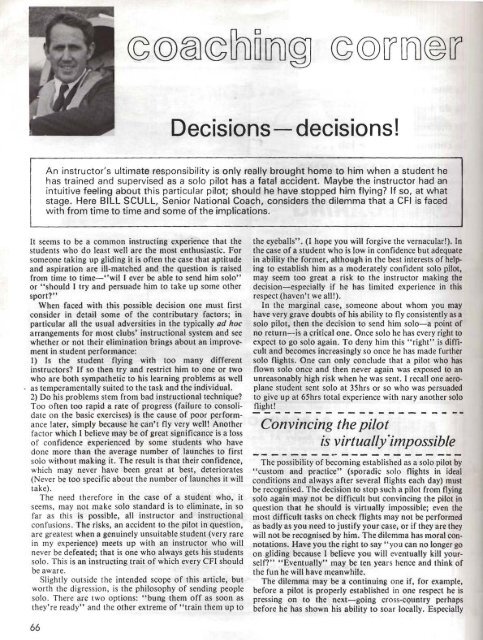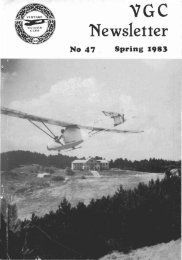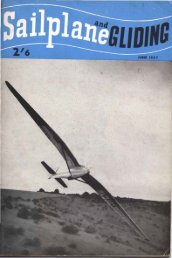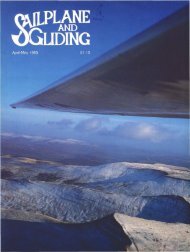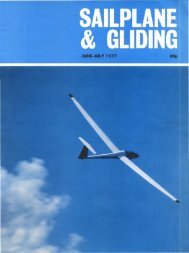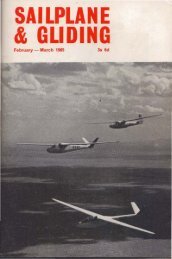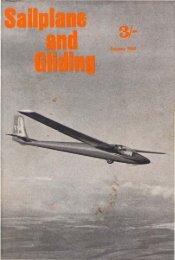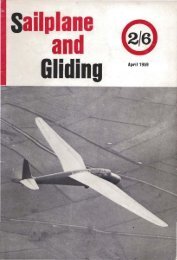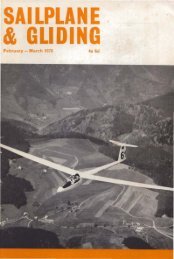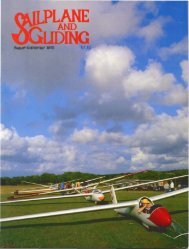Volume 28 No 2 Apr-May 1977.pdf - Lakes Gliding Club
Volume 28 No 2 Apr-May 1977.pdf - Lakes Gliding Club
Volume 28 No 2 Apr-May 1977.pdf - Lakes Gliding Club
- No tags were found...
Create successful ePaper yourself
Turn your PDF publications into a flip-book with our unique Google optimized e-Paper software.
Decisions-decisions!An instructor's ultimate responsibility is only really brought home to him when a student hehas trained and supervised as a solo pilot has a f.atal accident. <strong>May</strong>be the instructor had anintuitive feeling about this particular pilot; should he have stopped him flying? If so, at whatstage. Here BILL SCULL, Senior National Coach, considers the dilemma that a CFI is facedwith from time to time and some of the implfcations.It seems to be a common instructing experience that thestudents who do least wen are the most enthusiastic. Forsomeone taking up gliding it is often the case that aptitudeand aspiration are ill-matched and the question is raisedfrom time to time-"wil I ever be able to send him solo"or "should I try and persuade him to take up some othersport?"Wllen faced with this possible decision one must firstconsider in detail some of the contributary factors; inparticular all the usual adversities in the typicany ad hocarrangements for most dubs' instructional system and seewhether or not their elimination brings about an improvementin student performance:1) Is the student flying with too many differentinstructors? If so then try and restrict him to one or twowho are both sympathetic to his teaming problems as wellas temperamentally suited to the task and the individual.2) Do his problems stem from bad instructional technique?Too often too rapid a rate of progress (failure to consolidateon the basic exercises) is the cause of poor performancelater, simply because he can't fly very well'! Anotherfactor which I believe may be of great significance is a lossof confidence experienced by some students who havedone more than the average number of launches to firstsolo without making it. The result is that their conf,idence,which may never have been great at best, deteriorates(Never be too specific about the number of launches it willtake).The need therefore in the case of a student who, itseems, may not make solo standard is to eliminate, in sofar as this is possible, an instructor and instructionalconfusions. The risks, an accident to the pilot in question,are greatest when a genuinely unsuitable student (very rarein my experience) meets up with an instructor who willnever be defeated; that is one who always gets his studentssolo. This is, an instructing trait of which every CFI shouldbe aware.Slightly outside the intended scope of this article, butworth the digression, is the philosophy of sending peoplesolo. There are two options: "bung them off as soon asthey're ready" and the other extreme of "train them up tothe eyeballs". (I hope you will forgive the vernacular!). tnthe case of a student who is low in confidence but adequatein abitily the former, although in the best interests of helpingto establish him as a moderately confident solo pilot,may seem too great a risk to the instructor making thedecision-especially if he has limited experience in thisrespect (haven't we all!).In the marginal case, someone about whom you mayhave very grave doubts of his ability to fly consistently as asolo pUot, then the decision to send him solo-a point ofnQ return-is a critical one. Once solo he has every right toexpect to go solo again. To deny him this "right" is difficultand becomes increasingly so once he has made furthersolo flights. One can only conclude that a pilot who hasnown solo once and then never again was exposed to anunreasonably hjgh risk when he was sent. I recall one aeroplanestudent sent solo at 35hrs or so who was persuadedto give up at 65hrs total experience with nary another soloflight!Convincing the pilotis virtually·impossibleThe possibility of becoming established as a solo pilot by"custom and practice" (sporadic solo flights in idealconditions and always after several flights each day) mustbe recognised. The decision to stop such a pilot from flyingsolo again may not be difficult but convincing the pilot inquestion that he should isvirtuaUy impossible; evert themost difficult tasks. on check flights may not be performedas badly as you need to justify yOur case, or if they are theywill not be recognised by him. The dilemma has moral Connotations.Have you the right to say "yoll can no longer goon gliding because I believe you wlll eventually kill yourself?""Eventually" may be ten years hence and think ofthe fun ne will have meanwhile.The dilemma may be a continuing one if, for example,before a pilot ,is properly established in one respect he ispressing on to the next-going cross-c'Quntry perhapsbefore he has shown his ability to soar ~ocany. Especially66


